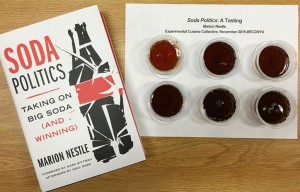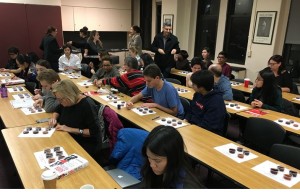The soda industry is having a very bad month: a roundup of events
It’s been a tough month for the soda industry.
- Yesterday, members of Mexico’s Nutritional Health Alliance held a press conference to complain that a Coca-Cola Christmas television ad violated the human rights of the indigenous people of the Mixe community of Totontepec.
The ad, released by Coca-Cola in late November on social media as part of its “OpenYourHeart” Christmas advertising campaign shows young people who are outsiders to the Mixe indigenous community arriving to build a Christmas tree of wood and Coca-Cola bottle caps, distributing Coca-Cola to young people from the community and transmitting the message “Stay United” in the Mixe language.
Coca-Cola removed the ad from its social media channels, but you can watch a version produced by the Alliance in which Mixe youth comment on the ad. The Alliance also has produced a translation.
Al Jazeera produced a video analysis.
- On November 6, the New York Times reported that the University of Colorado was returning a million dollar grant that had paid for the Global Energy Balance Network (GEBN), the group funded by Coca-Cola that said you didn’t need to worry about what you ate as long as you were active.
- On November 24, AP reporter Candice Choi published e-mails between the U. Colorado scientist behind the GEBN. These revealed that “Coke helped pick the group’s leaders, edited its mission statement and suggested articles and videos for its website.”
- Coca-Cola’s chief scientist, Rhona Applebaum, immediately resigned.
- On November 29, Helena Bottemiller Evich wrote in Politico how health advocates are running endless campaigns for so taxes, and that these will soon be coming to a polling place near you.
- On November 30, the UK’s Commons Health Committee called for a 20% tax on sugar-sweetened beverages.
- On December 1, the GEBN closed shop as a result of loss of funding.
- This week’s issue of The Lancet Diabetes and Endocrinology contains an opinion piece by U North Carolina professor Barry Popkin and Corinna Hawkes of City University London arguing that the world is eating too much sugar and that changes in policy are needed to encourage reduced consumption of sugary drinks. According to Politico Morning Agriculture, the American Beverage Association (ABA) is most unhappy about the piece. It claims that the prevalence of obesity and diabetes are rising but soft drink sales are falling in the U.S., saying “This proves that beverages are not driving these epidemics.” [Comment: as I discuss in Soda Politics, only half the population drinks sugary beverages meaning that those who do drink them drink a lot. Also, diabetes rates are falling in the U.S.]
- The ABA won a battle in San Francisco, but is surely losing the public relations war. It sued the city over a Board of Supervisors ban on ads for sugary drinks on city property and requiring warning labels on all billboards and other surfaces within the city. The ABA argued that both laws violate the First Amendment. You might think this argument would get thrown out of court immediately, but you would be wrong, as the Supreme Court is becoming more hostile to such laws. If you want to hear how the Board of Supervisors reacted to this, click here for the meeting transcript. (thanks to Politico Morning Agriculture for this item too and to Michele Simon for clarifying the legal issues).
I keep getting asked “why pick on sodas?” The answer: they are an easy target, low-hanging fruit in public health terms. They contain sugars but nothing else of redeeming nutritional value, are strongly associated with diets that raise the risk of obesity and its consequences, and are heavily marketed as what you need to be happy. The industry is fighting hard and on many fronts to maintain sales. Advocates are keeping its lawyers and lobbyists busy.
All this was just in the last month. Expect more to come.



